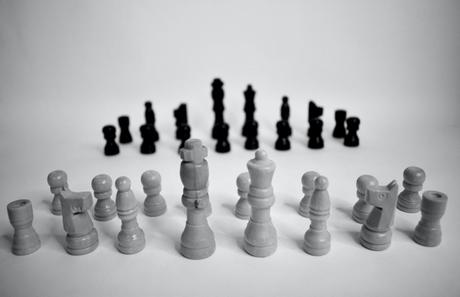
Polarization is the name of the game, these days, or so it would seem. To scan the headlines is to be constantly reminded of our species' tendency for conflict and destruction. Perhaps the "aliens" in every invasion movie have always been a metaphor for our own inclination towards self-annihilation. As conflict once again breaks out in the Middle East, war continues in Ukraine, human rights violations persist across the globe, and another contentious election season looms large in the U.S., it's worth examining the dynamics of our intense us vs. them drive.
Motive attribution asymmetry is one group's belief that their rivals are motivated by emotions opposite of their own. This idea, first discussed in 2014, can help us understand the disconnect that leads to so much continued aggression and polarization...and potentially offer us a partial solution. The study, which looked at the beliefs of Democrats and Republicans in the U.S., as well as Israelis and Palestinians, offered some valuable insights. When asked about the motivations for conflict of their rivals, they were more likely to identify hate. However, when asked to share their own motivations, they were more likely to indicate love (for their ingroup) as a motivating factor.
In part, this disconnect is the result of only seeing rivals during moments of conflict. We tend to isolate ourselves more from those that are more dissimilar to ourselves. This leads us to learn less about them, and to make far fewer observations of daily life upon which to base our opinions. These biases can have far-reaching implications for the nature and duration of conflicts.
Despite these discrepancies, the researchers also found evidence of our ability to accurately ascertain others' motivations when properly incentivized. Participants were able to accurately describe the motivations of their rivals when presented with a reward for doing so. This indicates our underlying awareness of the role good intentions or righteousness play in conflict more broadly.
As long as we continue to isolate ourselves from those that we are told to hate due to opposite group affiliation, we will find ourselves unable to alter the trajectory of that conflict. Groups have been working for years to normalize the interactions between Israelis and Palestinians, for example, and have made significant headway, but there is clearly a great deal more work to do.
Once we help others identify personally with a rival group, it becomes easier to see a different perspective and potentially change one's own beliefs or reach a compromise. The evolution of the Gay Rights movement is a prime example of this shift. As more family members were faced with the choice between continuing to hate or loving another family member, their beliefs changed.
Those in power will, of course, continue to be motivated by the desire to stay in power. That power is predicated on the consistency of motive attribution asymmetry amongst those they control. Thus, helping to connect each other and move from outgroup to ingroup not only has the potential to lessen conflict, but also dismantle the systems of power invested in maintaining that conflict.
